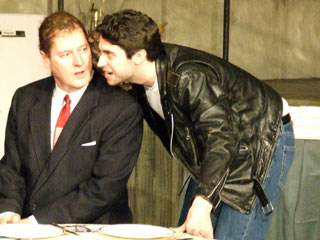The Fastest Clock in The Universe
by Anthony Chase
The Fastest Clock in The Universe
Philip Ridley’s 1992 play, The Fastest Clock in the Universe, made a bit of a splash and won a few awards with its London debut. It subsequently enjoyed a New York production, and ever since its multitalented author has been kicking about, exploring his creativity in various media, from illustration to poetry to film. While Ridley has enjoyed some high-profile critical attention, his is the sort of career that frustratingly does not seem to ignite in a world that does not value theatrical iconoclasts in the way the world of the 1960s or even 1970s did.

Torn Space Theater has given The Fastest Clock in the Universe a handsome production at the Adam Mickiewicz Dramatic Circle, under the meticulous direction of David Oliver.
The play tells the story of a man named Cougar Glass who adores his looks, but hates his age—which he improbably claims is only 19. Cougar lives with Captain Tock, who is infatuated with him. With echoes of numerous other plays and films about numerous other disjointed relationships, from Sleuth to Deathtrap (with a witty dose of Hitchcock tossed in), as the play begins, Glass and Tock are setting a trap. Cougar has stalked and lured 16-year-old Foxtrot Darling to the lair the two men share under the pretext of celebrating his own 19th birthday—yet again. Young Foxtrot (originally played by young Jude Law in London) has recently lost his own older brother, a role that Cougar hopes to fill briefly—and expand upon. He intends to use the boy to satisfy his own desires, sexual and otherwise, and then to dispose of him as callously as possible, a repetitive scenario that disturbs the captain. This plan is set awry, however, when Foxtrot arrives with his pregnant fiancée, Sherbet Gravel.
In his program notes, Oliver happily acknowledges that he is a Ridley fan. Not surprisingly, he first encountered the playwright’s work in London in the late 1980s. He has directed this script with delightfully deliberate overtones of Harold Pinter, including the unrelenting sense of menace with its underlying sense of unlikely comedy, as in Pinter’s own Birthday Party.
Oliver is aided in his quest to recruit Ridley converts by a most appealing cast. Richard Lambert plays Captain Tock with a wonderfully forlorn and fatalistic manner. Frustrated in his attraction for Cougar, distressed at his own hair loss, peculiarly attached to birds, he goes along with Cougar’s birthday plans and even agrees to disappear at the appropriate moment. We soon realize that the Captain sees opportunity for himself in Cougar’s vulnerability about his age. As Cougar’s plan derails, Lambert ignites a spark within the Captain that signals a new game afoot.
Candice Kogut is especially winning as Sherbet Gravel, Foxtrot’s controlling fiancée. Providing most of the momentum for the proceedings, she happily tips the action first in one dangerous direction and then in another, seemingly oblivious to the peril she risks as she willfully misinterprets Cougar’s dark mood at every turn—right up until she plays the fatal card she’s been hiding all along. Kogut never telegraphs a single surprising twist as she relentlessly and amusingly maneuvers the plot to its violent conclusion.
I was intrigued by the performance of Joy Scime as Cheetah Bee, the landlady of the mismatched (or are their perfectly matched?) Captain and Cougar. In the past, Scime has seemed to be a reliable actress of limited range, but in a recent string of extreme character roles, most recently at the Alleyway Theatre in On the Way to Heaven, and now in The Fastest Clock in the Universe, she is revealing new dimension and a more comfortable physicality. She enters the scene like some urban witch, conjuring Cougar back to stability as she chants her incantations from within a decaying fur coat. Clearly this is an actress who becomes better the more thoroughly she is disguised.
Mike Renna as Cougar Glass and Justin Fiordaliso as Foxtrot Darling throw themselves into their roles with fully committed abandon. Each accurately realizes the cynical understated comedy to be derived from the horrible.
Ron Schwartz’s shadowy environment provides the perfect setting for the murky doings of the play. Guy Wagner’s malevolent fight choreography sets the perfect tone for the climactic scene.
Oliver gives the script a most compelling outing, one that is certain to attract local interest both in the playwright who wrote it and in the capable actors who bring it to life.
|
Issue Navigation> Issue Index > v8n12 (week of Thursday, March 18, 2009) > Theater Week > The Fastest Clock in The Universe This Week's Issue • Artvoice Daily • Artvoice TV • Events Calendar • Classifieds |









 Current Issue
Current Issue